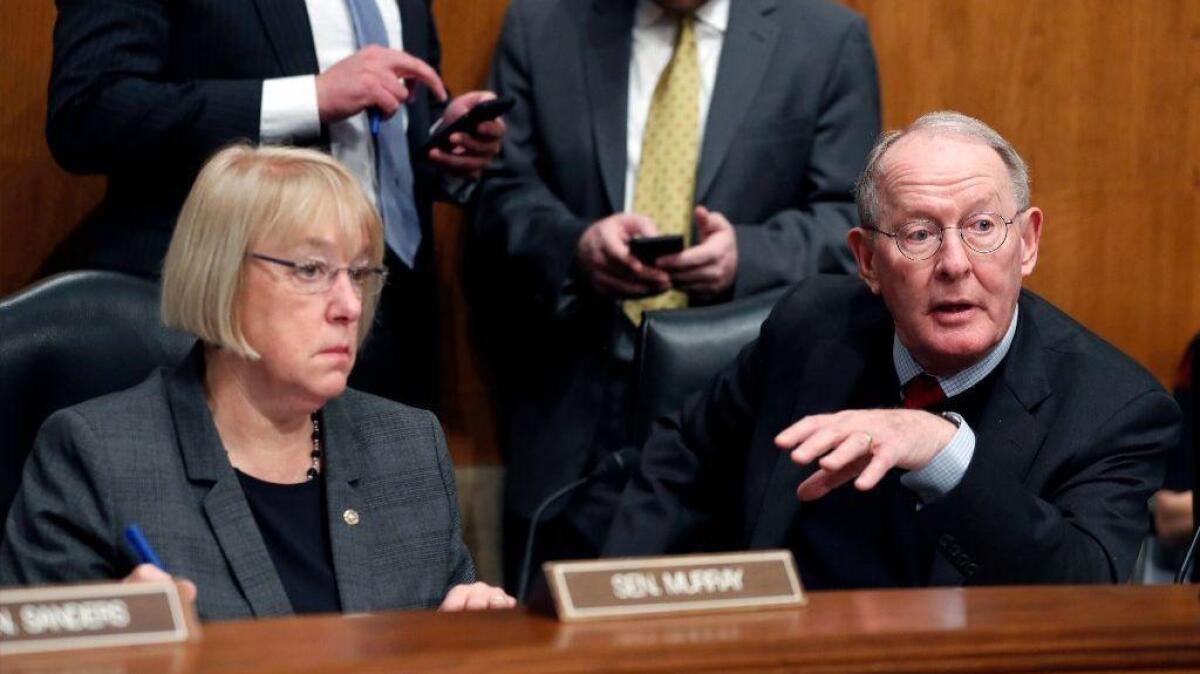Senators announce bipartisan deal to stabilize Obamacare markets

Reporting from Washington â The Senate moved closer Tuesday to a rare bipartisan deal to fix parts of the Affordable Care Act as a pair of leading senators announced an agreement designed to stabilize health insurance markets.
The deal â which was blessed by President Trump â still faces significant hurdles in Congress, particularly opposition from some conservative Republicans who want nothing less than a complete repeal of the 2010 healthcare law, commonly called Obamacare.
But the announcement of the compromise worked out by Senate Health Committee Chairman Lamar Alexander, a Republican from Tennessee, and the committeeâs senior Democrat, Sen. Patty Murray of Washington, nonetheless marks an important breakthrough in the nationâs more than seven-year battle over the healthcare law.
The deal would reinstate federal payments to insurers that Trump cut off last week, offering millions of Americans some relief from rising premiums and shaky insurance markets. In a nod to Republicans, it would give states limited new flexibility to offer cheaper, less generous health plans.
âFor the next two years, we want to make sure people can buy insurance at affordable prices,â Alexander said Tuesday at the Capitol. âThere is an emerging, encouraging consensus, and weâll see how far it goes.â
The compromise follows repeated failures by the GOP-led Congress in recent months to agree on legislation to dismantle the law and replace it with something else.
Alexander told senators the deal represents a modest fix, as the president wanted, and helps protect up to 16 million Americans who donât get health coverage through an employer or through a government program such as Medicare or Medicaid.
At the White House, Trump endorsed the deal, even though he has called the insurer payouts a âbailoutâ and continues to promise he will restart efforts next year to roll back the law.
âThatâs a very good solution,â Trump said. âWe think itâs going to not only save money, but give people much better healthcare with a very, very much smaller premium spike.â
Later, in a speech Tuesday evening to the Heritage Foundation, Trump took credit for the negotiations, saying that Democrats had âresponded to [his] call for them to take responsibility for their Obamacare disaster and work with Republicans to provide much-needed relief for the American people.â
âI commend the bipartisan work done by Sens. Alexander and Murray,â he said, but he added: âI continue to believe Congress must find a solution to the Obamacare mess instead of providing bailouts to insurance companies.â
The deal drew strong praise from Democrats as well, though prospects for passing it remain clouded by conservative criticism.
âObamacare is in a âdeath spiral.â Anything propping it up is only saving what Republicans promised to dismantle,â tweeted Rep. Mark Walker of North Carolina, chairman of the Republican Study Committee.
Freedom Partners, a Koch-backed nonprofit with close ties to the White House, said any deal should start with eliminating the mandates that individuals have insurance and larger employers provide it.
Senate Majority Leader Mitch McConnell (R-Ky.) was noncommittal about the Alexander-Murray deal Tuesday, and the office of House Speaker Paul D. Ryan (R-Wis.) did not immediately comment.
âWe havenât had a chance to think about a way forward yet,â McConnell said.
Most immediately, the proposed healthcare compromise would provide crucial federal payments to health insurers to help them provide reduced-price health plans to low-income Americans.
The White House announced last week that the federal government would cease these so-called cost-sharing reduction payments, which have been the subject of a years-long legal dispute over whether Congress or the administration has authority to fund them.
Trumpâs move to stop the payments shook the healthcare system, with insurers, state regulators and others warning of widespread disruptions and skyrocketing premiums as insurers moved to make up for the federal payments by hiking premiums for consumers.
The money at issue is roughly $7 billion in annual payments that the federal government makes to insurers to reimburse them for reducing deductibles and co-payments for low-income consumers, something the law requires health plans to do regardless of whether they receive government reimbursement.
The Alexander-Murray agreement would provide federal funding for the payments through 2019, a critical two-year extension that both Republican and Democratic state insurance regulators say is vital to keeping insurance rates in check.
It would authorize funding to help states create reinsurance programs to backstop insurers that are hit with unusually high claims, a mechanism commonly used in insurance markets to control rates.
Critically, the deal also would restore federal funding for advertising and outreach efforts to get Americans to sign up for coverage on marketplaces created through the 2010 law.
Over the summer, the Trump administration announced huge cuts in outreach efforts, stoking fears that the White House was intent on sabotaging the markets.
There is widespread agreement across the country that marketing and outreach are crucial to getting younger, healthier people to enroll in health plans and keep premiums in check for everyone.
The 2018 sign-up period is scheduled to start Nov. 1.
In addition to the market stabilization steps â which Democrats have been urging for months â the Alexander-Murray deal would make it easier for states to get out of some of the federal insurance rules set up by the 2010 law.
Republicans have been calling for years for this added state flexibility, but it has been a major source of partisan disagreement because Democrats fear it could weaken consumer protections enacted in the law.
Currently, insurers cannot turn away sick consumers or charge them more for coverage. Insurers also are barred from capping how much medical care they will cover.
And they are required to offer all consumers a basic set of benefits, including coverage for prescription drugs, maternity care and mental health and substance abuse services.
Under the Alexander-Murray deal, states would not be able to waive those rules for insurers.
âIt does not change the essential health benefits. It does not change the requirement for preexisting conditions,â Alexander said Thursday. âBut it does give states significant new flexibility in terms of offering policies.â
States could, for example, expand eligibility for catastrophic health plans that have very high deductibles and lower premiums.
Currently, such plans are limited to people under 30.
The Alexander-Murray deal would also make it easier for states to get approval from the federal government to experiment with new healthcare programs, a process that currently can take years.
Many state leaders have been pleading with the federal government to make that process easier.
Twitter: @noamlevey
ALSO
Opioid law draws scrutiny after Trumpâs pick for drug czar steps aside
NAFTA talks bog down over U.S. demands as latest round concludes
UPDATES:
7:50 p.m.: This article was updated with comments from President Trumpâs evening speech.
This article was originally published at 3:10 p.m.
More to Read
Get the L.A. Times Politics newsletter
Deeply reported insights into legislation, politics and policy from Sacramento, Washington and beyond. In your inbox three times per week.
You may occasionally receive promotional content from the Los Angeles Times.












